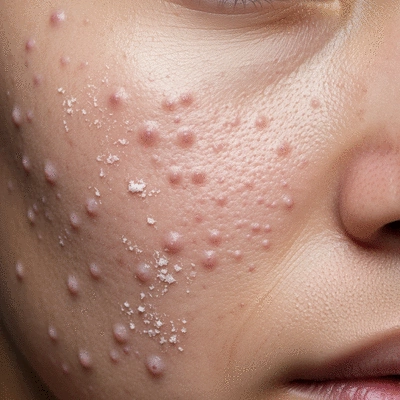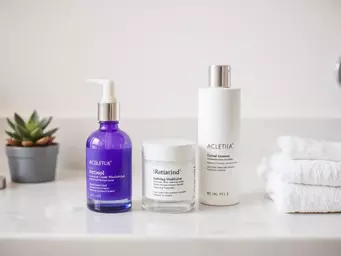Causes and Prevention of Acne

What if the key to clearer skin lies in understanding the balance between dryness and oiliness? The connection between dry skin and acne is more intricate than most people realize, and mastering this relationship can lead you to healthier skin. In this article, we uncover the paradox and provide actionable insights to help you navigate your skincare journey.
What You Will Learn
- Dry skin can trigger excessive oil production, leading to acne.
- A weakened skin barrier allows irritants to penetrate and cause inflammation.
- Harsh skincare products can exacerbate dryness and irritate the skin.
- Hormonal fluctuations can increase oil production despite underlying dryness.
- Choosing non-comedogenic products is essential to avoid clogged pores.
- A balanced skincare routine focusing on hydration and gentle cleansing is key for managing dry, acne-prone skin.
Understanding the Dry Skin-Acne Paradox: A Visual Overview
This visual highlights the key contributors to acne development in dry skin, including factors that lead to inflammation and clogged pores, and potential preventative strategies.
The Dry Skin-Acne Paradox
Dry skin can ironically *cause* acne. When skin dries out, the sebaceous glands may:
- Produce excess sebum (oil).
- Lead to clogged pores.
- Result in breakouts.
Disrupted Barrier & Compensation
Common Causes of Acne in Dry Skin
- Harsh Products: Alcohol/strong fragrances exacerbate dryness.
- Hormonal Factors: Fluctuations increase oil production.
- Lifestyle Influences: Diet, climate, and habits affect skin.
External & Internal Triggers
Role of Sebum & Clogged Pores
- Excess sebum leads to clogged pores.
- Clogged pores trap dead skin cells & bacteria.
- This fuels inflammation and breakouts.
The Breakout Mechanism
Key Prevention Strategies
- Prioritize gentle cleansing & hydration.
- Choose non-comedogenic products.
- Incorporate suitable acne treatments carefully.
- Stay educated about unique skin needs.
Balanced Skincare Approach
Understanding the Link Between Dry Skin and Acne
Have you ever felt perplexed by the presence of acne on your dry skin? You're definitely not alone! Many individuals grapple with this seemingly paradoxical issue. The connection between dry skin and acne can be traced back to skin barrier disruption, which may lead to compensatory oil production. When your skin dries out, it can trigger your sebaceous glands to produce excess sebum, which unfortunately contributes to clogged pores and subsequently, breakouts.
In my experience as a dermatologist, I've seen this issue time and again. It's crucial to understand that while dry skin often leads to flakiness and irritation, it can also create an environment where acne thrives. This dual challenge can be frustrating, but with the right knowledge, it's manageable! For a deeper understanding of acne and its various forms, you can refer to resources from Yale Medicine.

The Paradox of Acne in Dry Skin
Many people think of oily skin as the primary culprit behind acne, but that's not the whole story. When your skin is dry, it can actually become more vulnerable to breakouts due to a disrupted barrier. A weakened barrier allows for irritants to penetrate more easily, leading to inflammation and, yes, even acne. It’s a tricky situation, but recognizing this paradox is the first step in addressing it effectively.
- Dry skin can lead to excessive oil production.
- Weakened skin barriers allow irritants to penetrate.
- Inflammation is a common result of compromised skin health.
So, how do we tackle this problem? It starts with understanding your skin type, which is a fundamental part of any effective skincare routine. Let’s dive into the common causes that may be contributing to acne in your dry skin!
Identifying Common Causes of Acne in Dry Skin
Numerous factors can contribute to acne flare-ups in dry skin. Understanding these causes is essential for effective management. Here are some major culprits:
- Irritation from harsh products: Many skincare products contain alcohol or strong fragrances that can exacerbate dryness and irritation, disrupting the skin's natural balance.
- Hormonal factors: Hormonal fluctuations, particularly during menstrual cycles or stress, can lead to increased oil production despite dryness.
- Lifestyle influences: Factors like diet, climate, and even skincare habits can significantly impact the condition of your skin. For more information on acne causes and treatments, the Cleveland Clinic provides comprehensive insights.
Addressing these causes can make a world of difference! If you're experiencing dry, acne-prone skin, it's vital to choose products thoughtfully and consider how your lifestyle choices might be affecting your skin's health.
The Role of Sebum and Clogged Pores in Acne Development
Excess sebum production can play a significant role in acne development, even for those with dry skin. While it may seem counterintuitive, the combination of dry skin and overactive sebaceous glands can lead to clogged pores, which ultimately trigger breakouts.
- Sebum is essential for skin hydration but can lead to acne when produced in excess.
- Clogged pores trap dead skin cells and bacteria, fueling inflammation.
- Finding the right balance is critical—too much oil can cause breakouts, while too little can lead to dryness.
To keep your skin healthy and balanced, it's essential to understand this dynamic. Tailoring your skincare routine to address both hydration and oil production will help you maintain clearer skin.
Effective Strategies for Preventing Acne Flare-Ups
Now that we’ve identified the link between dry skin and acne, let’s explore some effective strategies for preventing those annoying flare-ups!
Pro Tip
To effectively manage dry, acne-prone skin, consider incorporating a hydrating serum containing hyaluronic acid into your routine. This ingredient helps retain moisture without clogging pores, creating a balanced environment that minimizes both dryness and breakouts.
Frequently Asked Questions About Dry Skin and Acne
Q1: Can dry skin really cause acne?
Yes, dry skin can ironically cause acne. When the skin becomes too dry, sebaceous glands may overcompensate by producing excess sebum, leading to clogged pores and breakouts. Additionally, a compromised skin barrier due to dryness can make the skin more vulnerable to irritants and inflammation, which are factors in acne development.
Q2: What role do harsh skincare products play in this paradox?
Harsh skincare products, especially those containing alcohol or strong fragrances, can strip the skin of its natural oils, exacerbating dryness. This increased dryness can then trigger the sebaceous glands to produce more oil, creating a vicious cycle that contributes to both dryness and acne. Such products can also weaken the skin barrier, making it more susceptible to inflammation.
Q3: How do hormonal fluctuations affect dry, acne-prone skin?
Hormonal fluctuations, common during periods like menstruation, pregnancy, or stress, can stimulate oil glands to produce more sebum, regardless of whether the skin is otherwise dry. This increase in sebum, combined with dry skin cells, can easily lead to clogged pores and subsequent acne breakouts.
Q4: What is a "non-comedogenic" product and why is it important for dry, acne-prone skin?
A non-comedogenic product is formulated not to block pores, which is crucial for preventing acne. For dry, acne-prone skin, choosing such products ensures that while you're providing necessary hydration, you're not inadvertently contributing to clogged pores and breakouts. This helps in maintaining a balanced skin environment that is hydrated without being prone to acne.
Q5: What is the key to managing dry and acne-prone skin effectively?
The key to effective management lies in a balanced skincare routine that focuses on gentle cleansing and adequate hydration, without stripping the skin or clogging pores. This involves using mild cleansers, non-comedogenic moisturizers, and carefully incorporating acne treatments. Understanding and responding to your skin's unique needs is paramount for clearer, healthier skin.
Summarizing Key Insights for Acne Management
As we wrap up our discussion on dry skin and acne, it's vital to recap the intricate relationship between these two conditions. Understanding the causes—including skin barrier disruption, harsh product irritation, and hormonal fluctuations—is essential for effective management. For a comprehensive overview of acne and the factors that contribute to its development, including the importance of the skin barrier, you can explore detailed information provided by PMC NCBI. The synergy of these factors can lead to frustrating flare-ups that many experience.
Prevention methods play a crucial role in this journey. Implementing a gentle skincare routine, choosing the right treatments, and being mindful of lifestyle choices can significantly impact your skin's health. Remember, every step you take is a part of a larger strategy towards achieving balanced, hydrated skin.
- Recognize the dual nature of dry skin and acne.
- Prioritize gentle cleansing and hydration.
- Choose non-comedogenic products to avoid clogged pores.
- Incorporate suitable acne treatments carefully.
- Stay educated about your skin's unique needs.
By embracing these insights, you are better equipped to manage your skin effectively. At Dry Acne Solutions, we aim to empower you with knowledge and tools that pave the way for clearer, healthier skin.

Taking Action Towards Healthier Skin
Now that you have a solid grasp of the strategies discussed, it’s time to take action! I encourage you to implement these techniques into your daily routine. Consistency is key, so give your skin time to adapt to the changes you make.
Don't hesitate to consult with a dermatologist for personalized recommendations tailored to your specific needs. Working together with a professional can lead to a more effective and rewarding skincare journey! Here are some practical steps to get you started:
- Track your skincare routine and its effects.
- Experiment with different products while monitoring skin response.
- Stay hydrated and maintain a balanced diet.
- Engage in stress-reducing practices like yoga or meditation.
Every small change contributes to your skin's health! Remember, your journey towards clearer skin is a marathon, not a sprint, and I’m here to support you every step of the way at Dry Acne Solutions. What are you excited to try first? Let’s empower each other on this path to vibrant, healthy skin!
Recap of Key Points
Here is a quick recap of the important points discussed in the article:
- Dry skin can lead to excessive oil production, causing acne breakouts.
- A weakened skin barrier allows irritants to penetrate, leading to inflammation and acne.
- Choose gentle, non-comedogenic products to avoid aggravating dryness and acne.
- Incorporate suitable acne treatments while maintaining hydration.
- Understanding your skin's unique needs is essential for effective management.









